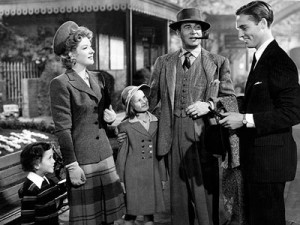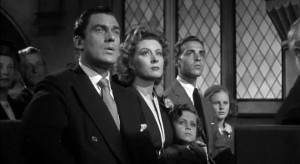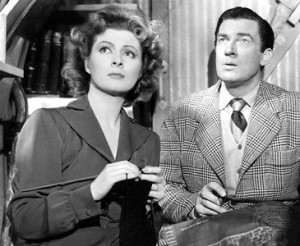Franklin D. Roosevelt was so impressed with the film that he requested the hasty release of the schmaltzy and patriotic “Mrs. Miniver.” Later, the President had the vicar’s lofty speech, which comes at the end of the film (see below), printed out in leaflet form and dropped by airplanes over Nazi-Occupied Europe.
Grade: C+ (** out of *****)
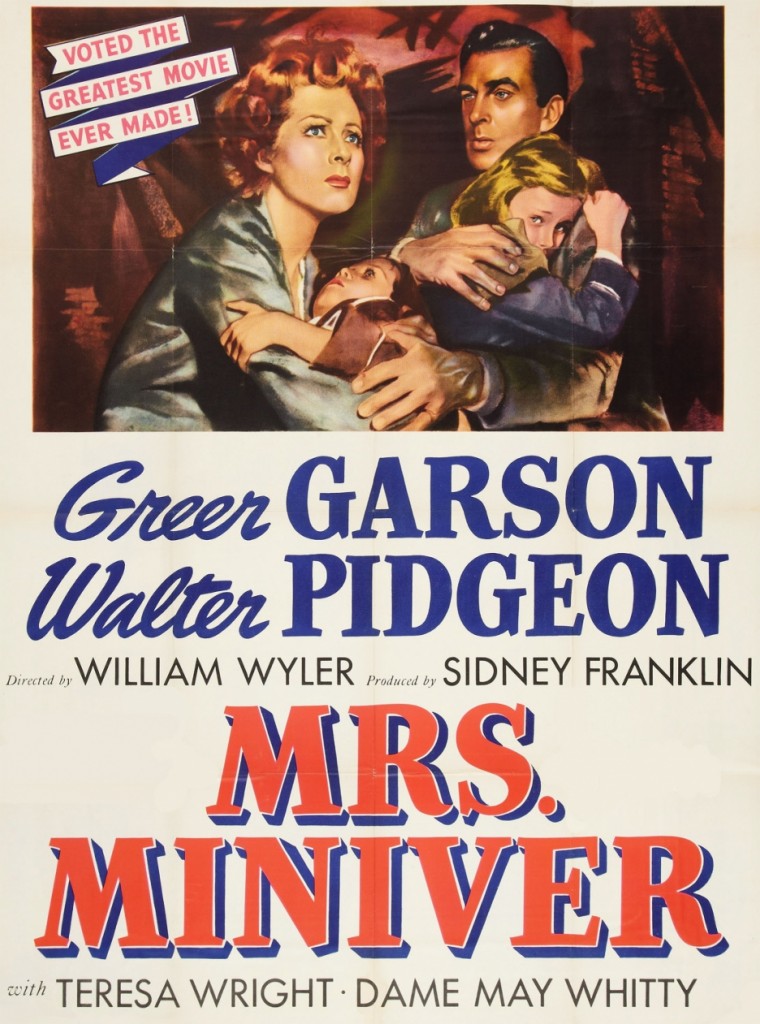
However, the reaction of playwright Lillian Hellman, who was friends with the director William Wyler, seems more reliable. Upon seeing the film, she told Wyler, “Willie, this is such a piece of crap.”
Based on a book by Jan Struther, adapted to the screen by four scribes (Arthur Wimperis, George Froeschel, James Hilton, and Claudine West), the film, a portrait of an English family during the Second World War, was a typically middlebrow MGM propaganda, a moral booster that reaffirmed the ideals of human suffering and fortitude. Needless to say, the picture represented a very Hollywood version of an English ordinary family.
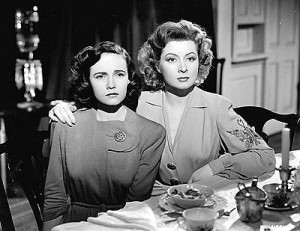 At the center of the story is an “ordinary housewife” (played by the stately and elegant Greer Garson, who won the Oscar), married to an architect (Walter Pidgeon) who always buys new cars the family cannot afford. Mrs. Miniver is the proud mother of three children, one elder and two young ones. The movie was meant to symbolize the gallantry and courage of the British housewife during the Blitz.
At the center of the story is an “ordinary housewife” (played by the stately and elegant Greer Garson, who won the Oscar), married to an architect (Walter Pidgeon) who always buys new cars the family cannot afford. Mrs. Miniver is the proud mother of three children, one elder and two young ones. The movie was meant to symbolize the gallantry and courage of the British housewife during the Blitz.
Mrs. Miniver’ss unconquerable spirit in the face of war was meant to inspire other (American) housewives. By concentrating on one presumably “typical” family, “Mrs. Miniver” was meant to be a universal portrait. Though Garson is supposed to be a “plain and ordinary” woman, she is always well-dressed, wearing expensive hats, and courteous and controlled in every crisis she faces.
The movie contains a number of touching scenes, such as the evacuation of Dunkerque and the harrowing night the family spends in a bomb shelter, but it loses the little credibility it has in a scene in which Mrs. Miniver encounters a downed German pilot she had captured.
Wyler’s direction is reliably skillful but impersonal, lacking the strength and depth he would show in his 1946 Oscar-winning film, “The Best Years of Our Lives.”
Receiving the largest (12) number of nominations in 1942, “Mrs. Miniver” swept most of the major Oscars, including Picture, Director, Actress, Supporting Actress (Teresa Wright), Screenplay (George Froeschel, James Hilton, Claudine West, and Arthur Wimperis), and Black-and-White Cinematography (Joseph Ruttenberg).
Of Similar Interest (and sentiment): The White Cliffs of Dover
Detailed Plot
Kay Miniver, her husband Clem (a successful architect), and her family live a comfortable life in Belham, a fictional village outside London. The house (named ‘Starlings’) has a large garden. They have three children, youngsters Toby and Judy and an older son Vin at university, and live-in staff, Gladys the housemaid and Ada the cook.
Vin comes, off from the university, meets Carol Beldon, granddaughter of Lady Beldon from nearby Beldon Hall. Despite initial disagreements about social class they fall in love, and Vin proposes to Carol in front of his family.
During the War, Vin enlists in the Royal Air Force as a fighter pilot. He is posted to a base near to his parents’ home and is able to signal his safe return from operations to his parents as he flies over the house. Joining other boat owners, Clem volunteers to take his motorboat to assist in the Dunkirk evacuation.
One morning, Kay, wandering in the landing stage, is startled to discover a wounded German pilot hiding in her garden. Demanding food and a coat, the pilot holds that the Third Reich will overcome its enemies. She feeds him, calmly disarms him when he collapses, and then calls the police.
Lady Beldon is against the marriage due to her granddaughter’s age, but she is unsuccessful, when Kay reminds her that she, too, was young when marrying her husband. Vin and Carol are married, and spend their honeymoon in Scotland. Kay and family take refuge in their shelter during an air raid, keeping their minds off the bombing by reading “Alice in Wonderland.” Though they barely survive a bomb that destroys the house, they take the damage with nonchalance.
 At the annual village flower show, Lady Beldon disregards the judges’ decision that her rose is the winner, instead announcing the entry of the local stationmaster, Mr. Ballard (Henry Travers), named the “Mrs. Miniver” rose, as the winner. As air raid sirens sound, and the villagers take refuge in the cellars of Beldon Hall, Kay and Carol drive Vin to join his squadron. On their journey witness fighter planes in a ‘dogfight,’ and Kay stops the car. The German plane crashes, and Kay takes the wounded Carol back home, where she died. When Vin returns from battle, he hears the terrible news–ironically, he is the survivor, while wife Carol loses her life for Britain.
At the annual village flower show, Lady Beldon disregards the judges’ decision that her rose is the winner, instead announcing the entry of the local stationmaster, Mr. Ballard (Henry Travers), named the “Mrs. Miniver” rose, as the winner. As air raid sirens sound, and the villagers take refuge in the cellars of Beldon Hall, Kay and Carol drive Vin to join his squadron. On their journey witness fighter planes in a ‘dogfight,’ and Kay stops the car. The German plane crashes, and Kay takes the wounded Carol back home, where she died. When Vin returns from battle, he hears the terrible news–ironically, he is the survivor, while wife Carol loses her life for Britain.
The villagers assemble at the badly damaged church where their vicar affirms their determination in a powerful sermon: “We in this quiet corner of England have suffered the loss of friends very dear to us, some close to this church. George West, choirboy. James Ballard, stationmaster and bellringer, and the proud winner only an hour before his death of the Beldon Cup for his beautiful Miniver Rose. And our hearts go out in sympathy to the two families who share the cruel loss of a young girl who was married at this altar only two weeks ago. The homes of many of us have been destroyed, and the lives of young and old have been taken. There’s scarcely a household that hasn’t been struck to the heart. And why? Surely you must have asked yourselves this question? Why in all conscience should these be the ones to suffer? Children, old people, a young girl at the height of her loveliness? Why these? Are these our soldiers? Are these our fighters? Why should they be sacrificed?
I shall tell you why. Because this is not only a war of soldiers in uniform. It is the war of the people, of all the people. And it must be fought not only on the battlefield but in the cities and in the villages, in the factories and on the farms, in the home and in the heart of every man, woman and child who loves freedom. Well, we have buried our dead, but we shall not forget them. Instead they will inspire us with an unbreakable determination to free ourselves, and those who come after us, from the tyranny and terror that threaten to strike us down. This is the People’s War. It is our war. We are the fighters. Fight it then. Fight it with all that is in us. And may God defend the right.
Vin moves to stand alongside Lady Beldon her, united in shared grief, as the congregation rises to sing “Onward, Christian Soldiers.” Through a hole in the bombed church roof, they observe the RAF fighters in V-for-Victory formation heading out to face the enemy.
Of Similar Interest
